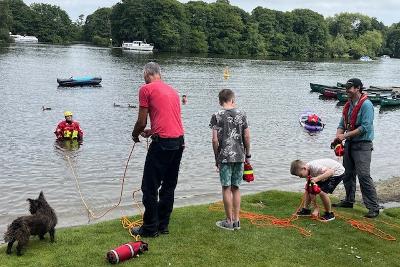Protect your community

Emergencies can and do happen, impacting households and communities. Emergency responders have to prioritise those in greatest need during an emergency - especially when life is in danger.
There will be times when you are affected by an emergency but your life is not in immediate danger.
During this time, you need to know how to help yourself and those around you. By becoming more resilient, you and your community can:
- Complement the work of local emergency responders
- Reduce the impact of an emergency on your community
- Adapt quicker to challenges affecting your community
- Increase confidence and sense of control in an emergency
What makes a resilient community?
Your community might be a built location, like a village or a street. Or it might be based around a shared interest or belief - such as a sports club or faith group.
Norfolk is a diverse county. Some areas are less resilient than others, making it even more important to work together and plan as a community.
A resilient community is one that:
- Communicates effectively and understands the resources available to them
- Understands the variety of risks that could disrupt their daily lives, and how vulnerable they are to them
- Uses existing skills, knowledge, and resources to plan for and respond to risks
- Understands who in the community might need extra support during an emergency
Create a community emergency plan
A community emergency plan should focus on the welfare of people and help to maintain the local infrastructure, such as roads.
Your community are more likely to be to aware of the specific issues that could affect them. For example, localised flooding or disruption to transport networks. Use this knowledge to help inform your plan.
Your plan should aim to:
- Provide a coordinated response from the local community
- Identify key local contacts and resources
- Identify safe places for residents to go if they have to evacuate
- Identify vulnerable people or groups who might need extra support
- Identify local hazards within the community
- Help keep people living in the community informed of the situation
You can use the Norfolk Community Risk Register to help inform your plans.
Download a basic community emergency plan template (Word doc, 352 KB)
Volunteering
Voluntary organisations offer support to communities in Norfolk in times of need. This is in addition to the emergency services attending incidents.
To learn more about what these organisations offer and how to volunteer, visit their websites:
- Norfolk and Suffolk 4×4 Response
- Norfolk RAYNET
- Norfolk Lowland Search and Rescue
- Community Action Norfolk
- Voluntary Norfolk
- St John Ambulance
- British Red Cross
You can also get tips for volunteering and helping others in emergencies on GOV.UK.
Webpages related to protect your community

Prepare vulnerable people for emergencies

Advice for event organisers





